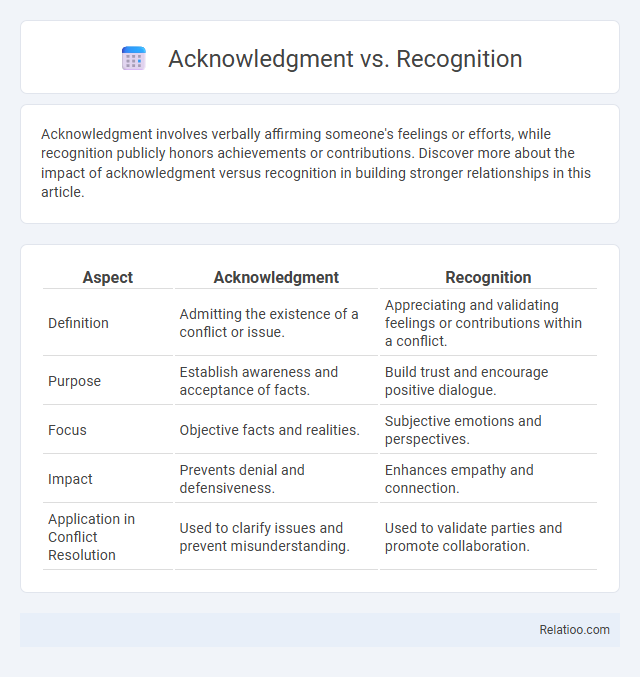Acknowledgment involves verbally affirming someone's feelings or efforts, while recognition publicly honors achievements or contributions. Discover more about the impact of acknowledgment versus recognition in building stronger relationships in this article.
Table of Comparison
| Aspect | Acknowledgment | Recognition |
|---|---|---|
| Definition | Admitting the existence of a conflict or issue. | Appreciating and validating feelings or contributions within a conflict. |
| Purpose | Establish awareness and acceptance of facts. | Build trust and encourage positive dialogue. |
| Focus | Objective facts and realities. | Subjective emotions and perspectives. |
| Impact | Prevents denial and defensiveness. | Enhances empathy and connection. |
| Application in Conflict Resolution | Used to clarify issues and prevent misunderstanding. | Used to validate parties and promote collaboration. |
Understanding Acknowledgment and Recognition
Acknowledgment involves explicitly admitting or accepting the existence or truth of something, often in a formal or factual context, while recognition refers to identifying and appreciating someone's efforts, achievements, or contributions, typically in a more personal or social setting. Understanding acknowledgment centers on the act of validation or confirmation, such as acknowledging a receipt or an error, whereas recognition emphasizes emotional or societal appreciation, like recognizing an employee's hard work with awards or praise. Both acknowledgment and recognition play vital roles in communication and motivation, but acknowledgment is more about validation, and recognition is about honoring value.
Defining Acknowledgment: Key Concepts
Acknowledgment involves the explicit acceptance and validation of facts, contributions, or feelings, serving as a foundational social and professional practice. Unlike recognition, which often implies public praise or reward, acknowledgment centers on sincere awareness and admission of someone's role or presence. Key concepts include authenticity, respect, and transparency, which ensure acknowledgment fosters trust and meaningful communication.
Defining Recognition: What Sets It Apart
Recognition distinguishes itself from acknowledgment and appreciation by actively celebrating an individual's achievements or efforts, rather than merely noting or accepting them. It involves formal or informal praise that highlights specific accomplishments, often motivating continued performance and reinforcing positive behaviors. Unlike acknowledgment, which confirms receipt or awareness, recognition creates a meaningful impact by validating contributions within social or professional contexts.
Core Differences Between Acknowledgment and Recognition
Acknowledgment refers to the act of verbally or formally admitting the existence, truth, or validity of something, often emphasizing awareness or acceptance. Recognition involves appreciating someone's efforts, achievements, or qualities, often through awards, praise, or formal honors that reinforce motivation and value. The core difference lies in acknowledgment being a confirmation of fact or presence, while recognition is an expression of approval or admiration for performance or contribution.
Psychological Impact of Acknowledgment vs Recognition
Acknowledgment and recognition both play crucial roles in enhancing motivation and self-esteem, yet acknowledgment focuses more on validating feelings and experiences, fostering emotional well-being and a sense of belonging. Recognition often rewards achievements and performance, boosting confidence and encouraging continued effort, while acknowledgment addresses the psychological need for acceptance and understanding. Your mental health benefits significantly when acknowledgment meets the deeper need for empathy and support beyond mere accomplishment.
When to Use Acknowledgment in the Workplace
Use acknowledgment in the workplace to formally confirm receipt of information or to show awareness of an employee's efforts without necessarily offering praise. It is ideal when documenting communication or demonstrating attentiveness to tasks while maintaining professionalism. Your timely acknowledgment fosters clarity and respect in team interactions, setting the foundation for effective collaboration.
When Recognition is More Appropriate
Recognition is more appropriate when highlighting an individual's achievements or contributions in a formal or public setting, such as awards, promotions, or official ceremonies. It emphasizes valuing the impact and effort of the person, often motivating continued excellence and boosting morale. Acknowledgment serves as a polite or simple confirmation of receipt or awareness, while acknowledgment is sometimes used interchangeably but may carry a more formal or legal tone.
Common Misconceptions About Acknowledgment and Recognition
Many people mistakenly believe acknowledgment and recognition are interchangeable, but acknowledgment involves simply noting someone's effort, while recognition actively rewards or praises achievements. A common misconception is that acknowledgment is less meaningful, though it plays a crucial role in validating contributions and fostering motivation. Understanding these distinctions improves workplace communication and enhances employee satisfaction.
Best Practices for Balancing Both Approaches
Balancing acknowledgment and recognition involves understanding their distinct roles in effective feedback strategies: acknowledgment refers to simply noticing and validating actions or efforts, whereas recognition includes public praise and rewards that reinforce desired behaviors. You should tailor your approach by integrating regular, sincere acknowledgment to maintain motivation and combining it with strategic recognition to foster engagement and enhance performance. Best practices emphasize consistency, specificity, and alignment with organizational values to create a positive work culture that supports sustained achievement.
Enhancing Team Morale: Integrating Acknowledgment and Recognition
Enhancing team morale requires a strategic blend of acknowledgment and recognition, where acknowledgment involves appreciating your team's efforts, and recognition highlights their achievements publicly. You can boost motivation by integrating personal thank-yous with formal awards, creating a culture that values both continuous effort and outstanding performance. This balanced approach fosters loyalty, drives productivity, and cultivates a positive work environment.

Infographic: Acknowledgment vs Recognition
 relatioo.com
relatioo.com